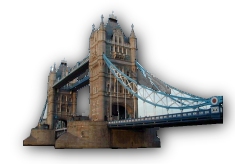|

Purcell
 Elgar
Elgar

Holst

Britten
 Williams
Williams
|
England
Although England was the first
to include plainsong in art music (in John
Gay's "Beggars' Opera"), the national
music
"Beggars' Opera"), the national
music trend came later to England, in comparison to other countries. One can
presume that one of the reasons is that England was not a country where
national music could have served the will for independence or defiance
against a foreign occupying culture, as in other countries (England has
always been independent).
Much like English painting, English music is mostly portrayed
as pastoral, and rich in calm auditory landscapes (and indeed, what kind
of trouble did the people of the late 19th and early 20th century, prosperous,
imperial Britain have?).
trend came later to England, in comparison to other countries. One can
presume that one of the reasons is that England was not a country where
national music could have served the will for independence or defiance
against a foreign occupying culture, as in other countries (England has
always been independent).
Much like English painting, English music is mostly portrayed
as pastoral, and rich in calm auditory landscapes (and indeed, what kind
of trouble did the people of the late 19th and early 20th century, prosperous,
imperial Britain have?).
 Elgar Elgar ,
as a composer that was not nationalist in his approach, used in his works,
the spirit of English popular plainsong, and served somewhat as an inspiration
for his followers, especially in his "Enigma
Variations" ,
as a composer that was not nationalist in his approach, used in his works,
the spirit of English popular plainsong, and served somewhat as an inspiration
for his followers, especially in his "Enigma
Variations"  .
Vaughan Williams .
Vaughan Williams collected English folk songs, studied ancient English
music and integrated its pastoral elements into his pieces, "Fantasy
on a theme by Tallis" in particular (Thomas
Tallis
collected English folk songs, studied ancient English
music and integrated its pastoral elements into his pieces, "Fantasy
on a theme by Tallis" in particular (Thomas
Tallis was a Renaissance
was a Renaissance English composer).
English composer).
Dances originated in this country:
Ecossaise -
a Scottish 2/4 dance from the 18th century.
Gigue - a fast dance in a triple metre, ending the
classical suite. Its form is usually binary, and sometimes the second part
opens with an inversion of the first section's theme. Bach tends to end
his harpsichord suites with a gigue.
- a fast dance in a triple metre, ending the
classical suite. Its form is usually binary, and sometimes the second part
opens with an inversion of the first section's theme. Bach tends to end
his harpsichord suites with a gigue.
Styles originated in this country:
Punk - eccentric, loud and outrageous music with protest, violent and abusive
lyrics.
- eccentric, loud and outrageous music with protest, violent and abusive
lyrics.
New Wave - the Pop music of the 1980s.
- the Pop music of the 1980s.


England on the WWW
 Sites
Sites
|
 Audio
Audio
|
 Video
Video
|
 Images
Images
|
 MIDI
MIDI
|
|
 Anthem
Anthem
 Where
Where
 Dances
Dances
 Notes
Notes
 Internet
Internet
 Projects
Projects
 Dictionary
Dictionary
 Finders
Finders
|